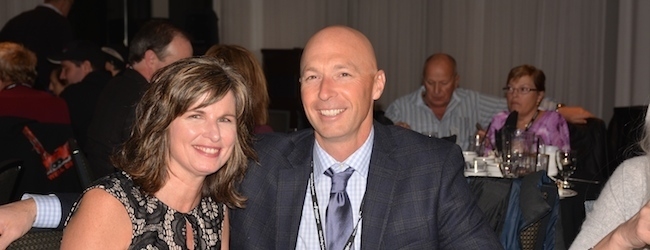
Features
Business
Success Stories
Blaine Matuga: ground water collaborator
April 18, 2018 By Carolyn Camilleri
 Photo by Ground Water Canada staff
Photo by Ground Water Canada staff The motto of Blaine Matuga’s company, Central Interior Pumps of Kamloops, B.C., really says it all: “We’re protectors of ground water.”
His dedication to all aspects of the water industry comes across strongly in conversation, but most importantly, it is demonstrated in his actions and the seriousness with which he takes his role in the industry.
He really walks the talk.
Matuga got into the pump industry some 17 years ago, when he was running North River Plumbing and Heating. While the plumbing business gave him some background in water industries, he wanted to focus on pumps, and so he launched Central Interior Pumps out of Kamloops, B.C. The first thing he did that year was to join the B.C. Ground Water Association to find out what he needed to do to get certified. Eventually, he would be president of the association; he is currently past president.
“When I started looking into the association, they helped,” he says. “They were holding the Canadian ground water convention in Kelowna, so I went to Kelowna, where I met people from the industry and told them I had already started up my company and that we wanted to get certified. And there was just an incredible response from the B.C. Ground Water Association members that put me into the right direction to get certification.”
At the time, certification courses were offered under the now-defunct Canadian Ground Water Association. Matuga was certified first, followed by his team – guys that were trained from the ground up.
“I’m a firm believer that you need to take courses,” Matuga says. “You just can’t learn it by jumping on the internet. You have to actually go to these courses and talk to the professionals who do this.”
Central Interior Pumps does mostly municipal wells, but also commercial, industrial, and agricultural wells and works with farmers, homeowners, developers, First Nations, and others.
“When we started out, there was a need for a company,” Matuga says, explaining that his company completes the wells after the drilling is done, installing the pumps, vents, and seals – everything needed to ensure all ground water regulations are met. They also provide services for well rehab, water filtration and rainwater harvest.
To ensure regulations continue to be met and that ground water is always properly protected, Matuga says it is critical that pump companies like his work together with drilling companies and hydrogeologists. That co-ordinated approach and process starts before the well is drilled.
“Everybody is actually working together. Right from the hydrogeologist to the driller, to the pump installer, so that the client knows he’s going to get a good well once we leave the site, and that we can be back there to assist if there are issues down the road.”
Those relationships – with other companies, members of the industry, and clients – are really important. Matuga’s advice: “First and foremost, be proud of what you do.”
As protectors of a resource as valuable and precious as ground water, pride in the industry helps educate the people who are going to use the water but also influences the other companies you work with.
“We want to make sure we’re doing things right, and that goes a long way with the companies you work with to ensure they’re going to do a good job,” he says.
“Our company only does the pump installing but we see the end result. Most of the time, once the driller is done, he never sees the well again unless maybe there has to be some rehab work done on it,” he says. “So we’re the guys customers are going to come back to, saying, ‘Hey, we got a problem with our pump. We got a problem with our well. How do we go about fixing this?’ We’re the guys that are going to get that ball rolling.”
Oftentimes, because they get that first call if there is a problem, they need to bring in a hydrogeologist. He believes a transition is happening in the States as well as in Canada, whereby well owners are now working with three people: the hydrogeologist, the driller and the pump installer.
“It’s not just about the hydrogeologist. It’s not just about the driller or the pump installer. It’s people working together,” Matuga says. “There has to open communication between three groups of people and the client. They need to work together.”
At the end of the day, everyone is working for the clients, he adds, and you have got to make sure you do a good job and that you are helping to educate people and explain their responsibilities.
“Anybody who is in the industry should promote to clients that clients also have to do a good job, because it’s their well – they need this for their community. They have to make sure that they’re educated on the proper care of a well.”
Matuga stresses the importance of ongoing education at an individual company level to ensure knowledge stays current and best practices are being used and passed along to clients and others in the industry.
“You need to go to these national shows and to your local provincial shows because that’s the best way to get educated on how to do these well rehabs, how to further the industry, and what’s out there that’s new and changing. You’re not going to learn it anywhere else,” he says. “That’s why I go to the National Ground Water Association show [in the U.S.]. I try to go every year. That’s where I get my training.”
He says it is also critical for company owners to keep workplace communication open and transparent.
“Include all your employees in the day-to-day stuff. Don’t hide anything from your employees or hide anything from those you are working with. It has to be an open table for everybody who is working together to get the job done,” he says.
“That’s important, whether you have a small company like us with six employees or a company that’s 15 or 20 people. Everybody should know what’s going on so there are no secrets. There’s no reason for it.”
Matuga acknowledges the industry-wide concerns about recruiting new people.
“On the pumps side of things in the industry, it’s still lacking in people coming into it,” he says. “It all comes from the commitment to bring a guy in and to pay him a decent dollar and get him trained up. That’s a problem.”
But it’s not the only problem; rather it is a combination of a couple of things, he says.
“We know for a fact that there are fewer drilling companies in the industry,” he says. “We’ve got drilling equipment out there that is drilling faster and doesn’t require as many people to do a well now. But mostly, there are not as many wells going in.”
Meanwhile, there is better awareness of the vital importance of ground water. In British Columbia, increased awareness is in large part due to the new Water Sustainability Act and Ground Water Protection Regulation. Matuga says it has only been a couple of years since it was brought into legislation, and there are some issues that need to be addressed, in particular, with respect to wording in the Ground Water Protection Regulation.
“And that’ll get done,” he says. “But overall, it’s brought more awareness to situations that we used to kind of slough off. It’s brought awareness that you have to follow procedures.”
“One hundred per cent, it’s getting better, for sure. People are starting to recognize that we can’t just have wells that are flowing artesian to just keep pumping water. We need to have proper well seals. We need to make sure that the ground water is protected. Some surface water as well as that ground water has to stay where it is.”
Matuga makes a point of giving credit to soon-to-be-retired Mike Wei, the head of aquifer and watershed science for the British Columbia Ministry of Environment.
“Mike Wei is very, very passionate about what he does. He is excellent for the industry – just excellent,” Matuga says.
While provincially in B.C., progress is being made, Matuga says we have work to do nationally. “I am not happy with the demise of the Canadian Ground Water Association. I’d love to see it re-establish.”
A national organization would certainly help to bring the industry together and improve ground water protection across the country. But there is another reason it is becoming increasingly important to have a national association: the U.S.
Matuga says the American National Ground Water Association has opened its arms to Canada’s ground water industry. “I can’t say it enough about their association. It’s an amazing association,” he says.
The Canadian ground water industry would benefit from strengthening its relationship with NGWA. Matuga says working with the U.S. on ground water issues doesn’t mean reinventing the wheel. “We only need to work with them to protect our ground water. Just like they feel it is so important to protect theirs.”
Until recently, only national ground water associations outside of the U.S. could join the NGWA. Because Canada doesn’t currently have a national association, the NGWA changed its bylaws to allow Canadian provincial associations to join. The OGWA and the BCGWA have become members. Matuga has joined a handful of others – notably the Ontario Ground Water Association’s Craig Stainton, who is spearheading the movement and doing a good job, says Matuga – to establish a new Canadian national association.
Matuga says provincial associations won’t be required to join the new Canadian association. In fact, he understands why some might hesitate to join. “But maybe once we get this re-established, they’ll look at it and see it is a good thing for us to have and to be a part of.”
One of the biggest benefits is especially valuable for the smaller provincial associations: access to a wealth of educational resources and training opportunities.
The name of the new association – the Canadian National Ground Water Association – has been registered and discussions are underway regarding next steps, including registering as a non-profit society, getting people in place and obtaining funding to cover set-up costs. If there is enough support from within the industry, the new association will be in a better position to get federal attention.
And surely, the protection of a precious resource shared with the U.S. deserves federal attention.
“We have a border that separates us between the U.S. and Canada but water doesn’t care whether there’s a border in between,” Matuga says.
Water flows across the country and across the borders – re-establishing a national association in Canada is a call to action to take the protection of that water to national and international levels.
Carolyn Camilleri is a Toronto-based writer, editor, and content strategist. She has been writing for consumer and trade magazines, as well as businesses and organizations, for more than 15 years.
Print this page

